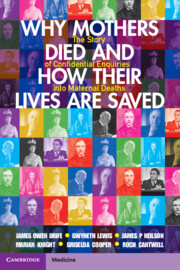 Why Mothers Died and How their Lives are Saved
Why Mothers Died and How their Lives are Saved Book contents
- Why Mothers Died and How Their Lives Are Saved
- Why Mothers Died and How Their Lives Are Saved
- Copyright page
- Contents
- Contributors
- Foreword
- Foreword
- Introduction
- 1 Historical Background
- 2 THE FIRST STEPS: 1900–1939
- 3 How the Confidential Enquiries Evolved
- 4 THE MISSING CHAPTER? PROLONGED LABOUR AND OBSTETRIC TRAUMA
- 5 HOW THE CHANGE BEGAN: THE STORY OF SEPSIS
- 6 Haemorrhage Then and Now
- 7 HYPERTENSION: ENQUIRIES, TRIALS AND RECOMMENDATIONS
- 8 The Story of Abortion
- 9 CHALLENGING TRADITION: THE STORY OF EMBOLISM
- 10 Pregnancy and Illness
- 11 Maternal Death due to Anaesthesia
- 12 Psychiatric Illness
- 13 THE MOTHERS WHO DIED: SOCIAL DETERMINANTS OF MATERNAL HEALTH
- 14 THE LEGACY IN THE UNITED KINGDOM: THE CONCEPT OF ‘NEAR MISS’ AND THE NEED TO KEEP SAVING LIVES
- 15 International Maternal Health: Global Action
- 16 International Action: Personal Views
- Figure Permissions
- Further Reading
- Index
7 - HYPERTENSION: ENQUIRIES, TRIALS AND RECOMMENDATIONS
Published online by Cambridge University Press: 05 April 2023
- Why Mothers Died and How Their Lives Are Saved
- Why Mothers Died and How Their Lives Are Saved
- Copyright page
- Contents
- Contributors
- Foreword
- Foreword
- Introduction
- 1 Historical Background
- 2 THE FIRST STEPS: 1900–1939
- 3 How the Confidential Enquiries Evolved
- 4 THE MISSING CHAPTER? PROLONGED LABOUR AND OBSTETRIC TRAUMA
- 5 HOW THE CHANGE BEGAN: THE STORY OF SEPSIS
- 6 Haemorrhage Then and Now
- 7 HYPERTENSION: ENQUIRIES, TRIALS AND RECOMMENDATIONS
- 8 The Story of Abortion
- 9 CHALLENGING TRADITION: THE STORY OF EMBOLISM
- 10 Pregnancy and Illness
- 11 Maternal Death due to Anaesthesia
- 12 Psychiatric Illness
- 13 THE MOTHERS WHO DIED: SOCIAL DETERMINANTS OF MATERNAL HEALTH
- 14 THE LEGACY IN THE UNITED KINGDOM: THE CONCEPT OF ‘NEAR MISS’ AND THE NEED TO KEEP SAVING LIVES
- 15 International Maternal Health: Global Action
- 16 International Action: Personal Views
- Figure Permissions
- Further Reading
- Index
Summary
Hypertension associated with proteinuria occurs in pre-eclampsia, which can progress to eclampsia (convulsions) and is a major cause of maternal death globally. CEMD Reports reminded doctors that high blood pressure may have other, much rarer, causes. Early diagnosis is important but in the 1950s signs of pre-eclampsia were sometimes taken lightly, allowing eclampsia to occur. The 1979-81 Report recommended that each region should have a specialist team to advise about preventing respiratory and clotting complications. Adherence to guidelines required a major culture shift. Deaths from these complications almost disappeared and by the year 2000 the main cause of death was brain haemorrhage. The Report emphasised the need for prompt administration of antihypertensive drugs. In 1995 a controlled trial showed that magnesium sulphate, the treatment favoured in the USA, was more effective than UK treatments for eclampsia. In 2002 the MAGPIE trial, led by Prof Lelia Duley in Oxford and involving 10,000 women in 33 countries, showed that it is also effective in pre-eclampsia. The rate of fits has fallen and, since 2010, the number of deaths has been in single figures.
Keywords
- Type
- Chapter
- Information
- Why Mothers Died and How their Lives are SavedThe Story of Confidential Enquiries into Maternal Deaths, pp. 89 - 94Publisher: Cambridge University PressPrint publication year: 2023
